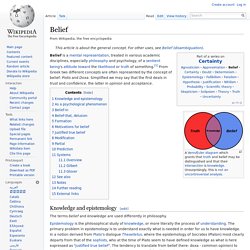

Jay Thomas
Knowledge. Knowledge acquisition involves complex cognitive processes: perception, communication, and reasoning; while knowledge is also said to be related to the capacity of acknowledgment in human beings.[2] Theories of knowledge[edit] In contrast to this approach, Wittgenstein observed, following Moore's paradox, that one can say "He believes it, but it isn't so," but not "He knows it, but it isn't so.

" [5] He goes on to argue that these do not correspond to distinct mental states, but rather to distinct ways of talking about conviction. What is different here is not the mental state of the speaker, but the activity in which they are engaged. For example, on this account, to know that the kettle is boiling is not to be in a particular state of mind, but to perform a particular task with the statement that the kettle is boiling. Wittgenstein sought to bypass the difficulty of definition by looking to the way "knowledge" is used in natural languages. Belief. Belief is a mental representation, treated in various academic disciplines, especially philosophy and psychology, of a sentient being's attitude toward the likelihood or truth of something.[1] From Greek two different concepts are often represented by the concept of belief: Pistis and Doxa.

Simplified we may say that the first deals in trust and confidence, the latter in opinion and acceptance. Knowledge and epistemology[edit] The terms belief and knowledge are used differently in philosophy. As a psychological phenomenon[edit] Mainstream psychology and related disciplines have traditionally treated belief as if it were the simplest form of mental representation and therefore one of the building blocks of conscious thought. Belief system. Belief is the state of mind in which a person thinks something to be the case with or without there being empirical evidence to prove that something is the case with factual certainty.

Another way of defining belief sees it as a mental representation of an attitude positively oriented towards the likelihood of something being true.[1] In the context of Ancient Greek thought, two related concepts were identified with regards to the concept of belief: pistis and doxa. Simplified, we may say that pistis refers to "trust" and "confidence", while doxa refers to "opinion" and "acceptance".
The English word "orthodoxy" derives from doxa. Jonathan Leicester suggests that belief has the purpose of guiding action rather than indicating truth.[2] In epistemology, philosophers use the term "belief" to refer to personal attitudes associated with true or false ideas and concepts. Knowledge and epistemology[edit] As a psychological phenomenon[edit] Religious belief. Forms of religious belief[edit] While it is popularly conceived that religions each have identifiable and exclusive sets of beliefs or creeds, surveys of religious belief have often found that the official doctrine and descriptions of the beliefs offered by religious authorities do not always agree with the privately held beliefs of those who identify as members of a particular religion.[2] A broad classification of the kinds of religious belief is documented below Universalism[edit] Some believe that religion cannot be separated from other aspects of life, or believe that certain cultures did not or do not separate their religious activities from other activities in the same way that some people in modern Western cultures do.

Some anthropologists[who?] Report cultures in which gods are involved in every aspect of life - if a cow goes dry, a god has caused this, and must be propitiated, when the sun rises in the morning, a god has caused this, and must be thanked. Universalism. Philosophy. Philosophy is the study of general and fundamental problems, such as those connected with reality, existence, knowledge, values, reason, mind, and language.[1][2] Philosophy is distinguished from other ways of addressing such problems by its critical, generally systematic approach and its reliance on rational argument.[3] In more casual speech, by extension, "philosophy" can refer to "the most basic beliefs, concepts, and attitudes of an individual or group".[4] The word "philosophy" comes from the Ancient Greek φιλοσοφία (philosophia), which literally means "love of wisdom".[5][6][7] The introduction of the terms "philosopher" and "philosophy" has been ascribed to the Greek thinker Pythagoras.[8] Areas of inquiry Philosophy is divided into many sub-fields.

These include epistemology, logic, metaphysics, ethics, and aesthetics.[9][10] Some of the major areas of study are considered individually below. Epistemology Rationalism is the emphasis on reasoning as a source of knowledge. Logic. Universalism.